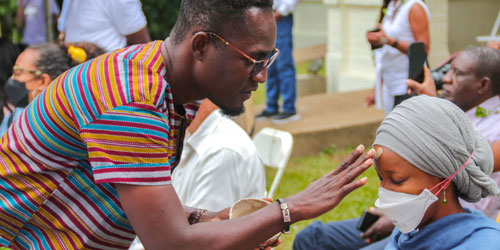-
Grants
6
-
Total Awarded
$3,165,000
-
Years
1989 - 2024
-
Categories
Grants
Cultural Survival advocates for Indigenous Peoples' rights and supports Indigenous communities’ self-determination, cultures, and political resilience. This X-Grant supports professional development of Cultural Survival staff to support execution of their programming.
This award provides general operating support to Cultural Survival. Cultural Survival advocates for Indigenous Peoples' rights and supports Indigenous communities’ self-determination, cultures, and political resilience. Cultural Survival is leading a coalition to campaign and implement a multi-pronged strategy to secure the recognition of Indigenous rights in the green economy. The SIRGE coalition, Securing Indigenous Rights in the Green Economy, is a coalition of Indigenous Peoples, leaders, and allies, championing a just transition to a low-carbon economy. As the global demand for minerals needed to transition to renewable and green technologies grows, SIRGE advocates with government, corporate, and financial decision-makers to avoid dirty mining and protect the rights and self-determination of Indigenous Peoples around the globe, many of whom live in areas rich in these minerals.
Cultural Survival is an Indigenous-led nonprofit that advocates for Indigenous Peoples' rights around the world and has supported Indigenous communities’ self-determination, cultures, and political resilience since 1972. Cultural Survival works for a future that respects and honors Indigenous Peoples' inherent rights and dynamic cultures and empowers Indigenous Peoples to pursue their self-determination and sustain their lands, cultures, and ecosystems. This grant provides Cultural Survival support for four of their programs: Community Media, Indigenous Rights Radio, the Keepers of the Earth Fund, and Bazaars (Sustainable Livelihoods).
Cultural Survival advocates for Indigenous Peoples' rights around the world and has supported Indigenous communities’ self-determination, cultures, and political resilience since 1972. The organization is made up of majority Indigenous women staff based in nine countries and supports a number of programs including direct grantmaking to Indigenous efforts and Indigenous media. Due to the organization’s robust network of partnerships with Indigenous communities spanning over 70 countries on six continents, its funds are able to reach those most in need regardless of communication restrictions, such as lack of Internet access, or remote geographic locations.
To support broad-based Indian participation to prepare, refine, and democratize the final draft of the "Forest Peoples' Charter" and to assure representative indigenous participation in UNCED.
To support conservation programs with indigenous people in Ecuador and of further project planning in the tropical Andean region (over three years).





